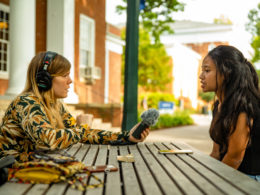When Matt Kuhn first jumped on a mountain bike to ride trails with disadvantaged youth after school in 2010, he knew he was joining something special.
Fast forward to 2022, and you will see Kuhn cruising along in a big, white van pulling a trailer full of bikes that is headed to pick up kids in Fairfield Court after school. Kuhn’s stellar relationship-building skills have guided him to a career in youth outdoor recreation, specifically in the mountain biking industry. As leader of Richmond Cycling Corps (RCC), he helps kids living in government housing get into the sport of cycling.
The nonprofit started in 2009 when a few professional cyclists decided to spend time after work biking with children in public housing after school. The program, originally named Richmond Pro Cycling, evolved into the organization Kuhn now leads as executive director.

From casual after-school rides to professional-level training
To better understand exactly what RCC does, Kuhn broke the organization down into two main categories.
“We have a core team that is a race team,” he said. “They race against other students across the state. They train all year, and those kids are the ones we are closest to. We don’t even have a set practice.
“We are texting every day and riding pretty much every day. On top of that, we work with some other school programs in the area. If I see kids that really like cycling, or could really use the help, then those are the kids that we are going to go after.”
As Kuhn got more involved and began to build lifelong friendships with the riders, he wanted to ensure the program was there to stay. One way he does this is by supporting students on and off the trails.
“As you ride with kids, if you get the same kids over and over again, you start to get to know them,” Kuhn said. “They have stuff going on. If you’re a decent person, you’ll help them with that. The whole thing is: We ride bikes, but there’s also an entire day of driving kids to the dentist or whatever a teenager might need work with. Schoolwork, going to the doctor or even getting a driver’s license. That’s what we do.”
Treated like professionals
Thanks to the generous support of corporate sponsors Endura and Shimano, RCC is able to provide professional-level training and equipment for the race team riders. The team recently took a week-long trip to Snowshoe Bike Park in West Virginia. With no cell service and crystal-clear views of the Milky Way at night, Kuhn shared that these remote trips provide a special experience for the kids that takes them far away from their typical life at home.
Kuhn tries to run the team like a professional cycling team, which includes giving all riders a full kit, bike, shoes, helmet and training plan and covering race fees and setting everything up.
“I think it makes them feel good,” said a smiling Kuhn. “When we show up to the races, which happen at private schools throughout the state, we are always racing against private school kids. You can imagine what the races look like. We used to kind of show up looking like the ‘Bad News Bears.’ We had a dinky looking van, but now when we show up, the team looks legit. We look good.”
Competing in these national mountain bike races is no easy feat, as the other racers come from upper-class families that have been training them to become professional-level riders from an early age. Over the years, Kuhn has noticed that more people of color are competing, and he hopes this trend will continue moving forward.
While finding sponsors to help fund community-driven programs makes a difference, Kuhn said the key to inclusion in cycling is making everything less expensive.
“Getting into cycling is tough, from shoes to clothes to the bike and all the stuff,” Kuhn said. “It can cost upwards of $6,000, so making things affordable can go a long way.”

Riding for all skill levels
Although skill levels vary at RCC, Kuhn wants every kid to feel welcome.
“If a neighborhood kid asks to ride, and I have an extra bike, I’m like yeah, of course you can come,” he said.
Oftentimes, Kuhn even has the most fun taking the less-serious middle schoolers out to the bike park.
“My favorite group to ride with is always sixth and seventh grade girls,” he said. “We’ll take them to the BMX track and hang out there for an hour. It’s crazy because they are riding and screaming, and it’s just not what they would normally do. It’s a wild day, and they are always the most excited to come back.”
Some of Kuhn’s participants decide riding isn’t for them, while others go on to compete at a national level. But one of his goals is to find the students who need the camaraderie and support, and he works to instill a passion within them.
“We traditionally go for kids that are either missing 100 days of school a year or going to school and getting in a fight and are suspended for 10 days and then coming back and getting in another fight and suspended for another 10 days,” Kuhn said. “That’s the kind of kid I want to work with. I’ll take the easy kids, but I want to help the kids who really need it.”
Summit successes
When asked about the best moments of his RCC career, Kuhn said what he enjoys most about his job is seeing kids graduate, especially the kids who had difficult times making it to the final stage.
Personal-life wins, for Kuhn, are the best part of the program.
“There are a lot of really good parts to my job, but the best part is seeing kids come out of their shells,” Kuhn said. “If you’re living in these neighborhoods, you are experiencing trauma. There are shootings. Teachers are just constantly putting out fires all day long. It’s so hard.
“The best thing about endurance exercise is it helps bring you down from fight or flight. So, you spend all your time in fight or flight responding, and endurance exercise brings you down from that and can put you in a good mood.”

Peddling forward
Right now, Kuhn is looking for a building to house the organization and hopes to keep RCC small and intimate with a focus on helping kids grow. Kuhn said his time with RCC has helped him become more patient and empathetic.
“I think most of the time, when someone is being rude or annoying, it is probably because of something unrelated to what is going on,” he said. “The term people are talking a lot is trauma-informed care. This kid is having a bad day not because he had to do his math homework but because something is going on at home. Be nice to this kid, and the problem will go away. That usually does it.”
To learn more about RCC and the upcoming race season, check out its website and be sure to follow RCC on Instagram and Facebook. You also can donate directly here. All photos and videos are property of Richmond Cycling Corps and Shimano.










